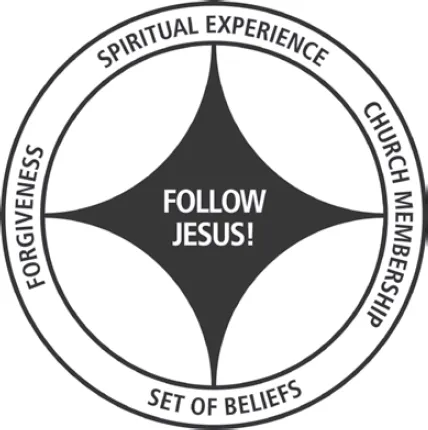![]()
Part I
Jesus
Is the Center of Our Faith
![]()
ONE
Christianity Is Discipleship
If any want to become my followers, let them deny themselves and take up their cross daily and follow me.
Luke 9:23
HOW IS ONE to answer the question, “What is Christianity?” While that question sounds ultrasimple, it can be answered in a variety of ways. While all Christian traditions affirm that Jesus is central, each has a tendency to interpret this in its own way. In this chapter, I seek to describe how Jesus and the first disciples understood the Christian faith, and how several contemporary traditions view it. We must begin with Jesus and the early church.
How did early Christians understand Christianity?
For three years the first followers of Jesus lived, ate, and worked with Jesus. They observed how he cared for the poor, healed those who were ill, gave sight to the blind, related to the marginalized, forgave sinners, taught the multitudes, and responded to enemies. During these years of compassionate, Spirit-filled ministry—and through Jesus’ subsequent death, resurrection, and the giving of his Holy Spirit—discipleship became central to those first followers.
The first followers of Jesus were called disciples. While that is what the followers of any great teacher were called, Christ’s disciples went further than simply being students of Jesus. Their creed was “Jesus Christ is Lord” (Philippians 2:11). This commitment needed to be lived within a hostile environment in which everyone was required to pledge their supreme allegiance to Caesar and his dominant order.
For the disciples, ultimate allegiance belonged to Jesus. He was inaugurating God’s social order. This order and the relationships in it functioned as the continuing body of Christ. The task of the disciples and all subsequent followers was to continue what Jesus had begun. They followed his nature and style in daily life.
To live in joyful obedience to Jesus required something supernatural. It required followers to be “born again” (John 3:3 KJV). To be born again meant to make a new start. Disciples needed to repent, or turn from, following other lords or loyalties and to commit themselves to following Jesus as their living Lord. On the day of Pentecost they received the Holy Spirit, which gave them the insight and power needed to live as Jesus had lived.
Christ’s final instruction to those disciples was to make more disciples, and that is what they did. Even when persecution made it difficult, those first Christians shared throughout the Roman Empire their understandings of Jesus and what it meant to follow him. The early followers became known as “people of the Way” because they were living in the way of Jesus.
How do today’s believers understand Christianity?
Following are four ways in which people of different traditions answer the question “What is Christianity?” These viewpoints are listed in the illustration.
The Christian faith
Is Christianity a set of beliefs?
Believers in liturgical churches tend to place their emphasis on God the Father and on a right set of beliefs. They teach the basic beliefs of the Christian faith in confirmation or membership classes and repeat the Apostles’ Creed each Sunday. Some might go so far as to say, “Christianity is believing.”
Beliefs are important, and we can all learn from those in liturgical churches who have a high regard for creeds and statements of faith. The apostle Paul gives support to beliefs by promising early Christians, “If you confess with your lips that Jesus is Lord and believe in your heart that God raised him from the dead, you will be saved” (Romans 10:9).
The Christian faith might be seen as a combination of believing, belonging, and behaving.1 John Wesley (1703–91) identified these parts of Christianity as orthodoxy (right beliefs), orthopathy (right experience), and orthopraxy (right practices).2
Followers of Christ become unbalanced when they stress one area of the Christian faith, such as beliefs, at the expense of others. Christians from an Anabaptist perspective affirm that the Christian faith includes a set of beliefs, but they insist that an emphasis on orthodoxy, or right beliefs, needs to be kept in balance with other aspects of the Christian faith, especially that of orthopraxy, or right practice.
Is Christianity a spiritual experience?
Charismatic and Pentecostal Christians tend to place emphasis on the Holy Spirit and on special spiritual experiences (orthopathos). Christians of this persuasion often testify that they came to faith through a supernatural experience such as being healed, freed from a demon, or guided in some special way. Some would go so far as to say that speaking in tongues is the essential indicator that one is a Christian.
Anabaptists would affirm that spiritual experience is part of the Christian faith. They recognize that Jesus performed supernatural miracles and that early Christians saw the apostles do many signs and wonders (see Acts 2:43). But Anabaptist Christians caution that Christian faith cannot be described as or limited to spiritual experience.
Is Christianity an experience of forgiveness?
Evangelical Christians stress the sacred experience of being forgiven by God. Some evangelists, after preaching the gospel in a convincing way, invite those who want to become Christians to pray the “sinner’s prayer.” Some would go so far as to say that one should be able to name the time and place when confession of sin was made and forgiveness was received.
Christians from an Anabaptist perspective affirm that confession of sin and forgiveness are essential for salvation. Jesus began his ministry by saying, “Repent, and believe” (Mark 1:15). But forgiveness of sins is not the sum total of the Christian faith. While praying a sinner’s prayer may begin the Christian journey and be seen as the minimum requirement for entrance into heaven, there is more to the Christian faith than forgiveness.
Is Christianity discipleship?
Anabaptist Christians affirm that Christianity includes beliefs, spiritual experience, and forgiveness. But particular emphasis is placed on following Jesus in daily life. Anabaptist Christians will go so far as to say, “Christianity is discipleship!”
Discipleship means following Jesus in daily life. It calls for living the same kind of life that Jesus lived. Jesus said, “If you continue in my word, you are truly my disciples” (John 8:31). Disciples are joyfully obedient to Jesus Christ because of what he did and continues to do for them.
Just as some traditions might stress right beliefs, right experience, or right forgiveness at the expense of discipleship, Anabaptists are in danger of stressing right practice (orthopraxy) at the expense of ignoring other aspects of faith. Renowned Anglican theologian J. I. Packer once shared with me, “I get frustrated that Anabaptists don’t seem to take time to think. They are always doing things! But then, I must admit that they are doing more than we.”3
Discipleship insists that faith and obedience must be held together. Faith requires obedience, and obedience requires faith. James insists that if there is no obedience, there is no faith, saying, “Faith by itself, if it has no works, is dead” (James 2:17).
Jesus himself said, “Not everyone who says to me, ‘Lord, Lord,’ will enter the kingdom of heaven, but only the one who does the will of my Father in heaven. On that day many will say to me, ‘Lord, Lord, did we not prophesy in your name, and cast out demons in your name, and do many deeds of power in your name?’ Then, I will declare to them, ‘I never knew you; go away from me, you evildoers’ ” (Matthew 7:21-23).
How did early Anabaptists come to this faith?
Early Anabaptists, through Bible study, discussion, and prayer, rediscovered a living Jesus. They found that his life, priorities, and commands were clearly written in the Gospels. They rooted their obedience to Jesus in the Sermon on the Mount. The Holy Spirit reminded them who he was, what he had said, and what he called them to do.
“Jesus is the center of our faith” is the first core value of Anabaptist faith. While other traditions might also say that Jesus is central, Anabaptist Christians have strongly emphasized that obedient following of Jesus, not mere believing, is what makes Jesus central. Adult baptism communicates to family, friends, and a church community that a person is committed to following Jesus in daily life.
The late Doris Janzen Longacre, a Mennonite theologian and the author of the More-with-Less cookbook, confirmed this when she wrote, “We can rehearse background facts, share experience, and distill standards to guide future decisions. We can attend workshops and conferences, draw on still more experience, and collect a helpful library, but when we close the books and come home from the discussions, one voice still speaks in the silence. For Christians it is the call to obedience.”4
Early Anabaptists were encouraged by the words of Jesus, who said, “Come, you that are blessed by my Father, inherit the kingdom prepared for you from the foundation of the world; for I was hungry and you gave me food, I was thirsty and you gave me something to drink, I was a stranger and you welcomed me, I was naked and you gave me clothing, I was sick and you took care of me, I was in prison and you visited me” (Matthew 25:34-36).
Jesus ends his famous Sermon on the Mount, which serves as the manifesto of the Christian faith, by saying, “Everyone then who hears these words of mine and acts on them will be like a wise man who built his house on rock. The rain fell, the floods came, and the winds blew and beat on that house, but it did not fall, because it had been founded on rock. And everyone who hears these words of mine and does not act on them will be like a foolish man who built his house on sand. The rain fell, and the floods came, and the winds blew and beat against that house, and it fell—and great was its fall!” (Matthew 7:24-27).
How do we understand discipleship?
If the essence of Christianity is discipleship, or following Jesus in daily life, it is important for us to understand clearly what this means. Christians in an Anabaptist stream believe that when a person comes to an age of accountability—that is, when a person is old enough to become responsible for his or her decisions—that individual must make a decision, or a series of decisions, to turn from other loyalties and ways of living to following Jesus Christ. “It is not enough to know about Jesus and salvation,” writes Bible and ministry professor Michele Hershberger in God’s Story, Our Story. “It’s not enough to be able to explain what everything means in the Story and how it all fits together. Knowing all this, you must make a choice. Will you follow Jesus? Will you say yes to him?”5
Such a decision may mean making a new start both personally and in the context of a new group. When Jesus said, “You must be born again” (John 3:7 KJV), he was referring to something more than “being saved.” While being saved often means being delivered from bad habits or being saved from going to hell at the end of this life, being born again means beginning to live in a new way in this life. Being born again causes one’s thoughts, attitudes, and actions to be transformed, and enables one to make a new start.
My father, whose first language was German, understood Christianity as nachfolge Christi, which means “following Jesus.” When it came to baptism, he was perplexed by the question “Are you saved?” His answer was, “I am a follower of Jesus.” He was baptized upon that confession of faith.
Professor of pastoral care...

